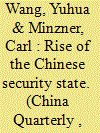|
|
|
Sort Order |
|
|
|
Items / Page
|
|
|
|
|
|
|
| Srl | Item |
| 1 |
ID:
139556


|
|
|
|
|
| Summary/Abstract |
Over the past two decades, the Chinese domestic security apparatus has expanded dramatically. “Stability maintenance” operations have become a top priority for local Chinese authorities. We argue that this trend goes back to the early 1990s, when central Party authorities adopted new governance models that differed dramatically from those of the 1980s. They increased the bureaucratic rank of public security chiefs within the Party apparatus, expanded the reach of the Party political-legal apparatus into a broader range of governance issues, and altered cadre evaluation standards to increase the sensitivity of local authorities to social unrest. We show that the origin of these changes lies in a policy response to the developments of 1989–1991, namely the Tiananmen democracy movement and the collapse of communist political systems in Eastern Europe. Over the past twenty years, these practices have developed into an extensive stability maintenance apparatus, whereby local governance is increasingly oriented around the need to respond to social unrest, whether through concession or repression. Chinese authorities now appear to be rethinking these developments, but the direction of reform remains unclear.
|
|
|
|
|
|
|
|
|
|
|
|
|
|
|
|
| 2 |
ID:
192290


|
|
|
|
|
| Summary/Abstract |
This article examines the rearticulation and reconfiguration of US-led imperialism vis-à-vis Tunisia in the aftermath of the 2010–2011 popular revolt. Challenging the prevalent economic-military binary in analyses of US-led imperialism in the region, it treats instead economic intervention in Tunisia as linked to and shaped by ‘security’ intervention, with the violence of the War on Terror laying the groundwork for a new wave of primitive accumulation. Employing conjunctural analysis, it considers how the 2015 attacks, largely targeting European tourists at a Sousse beach resort and the Bardo national museum, were mobilized to further Tunisia’s imbrications within imperialist security architecture through legal interventions, border violence, peripheral militarization, increased ‘security’ spending and neocolonial ‘expertise’, debt and racialized financialization. In doing so, the 2015 security conjuncture reinforced Tunisia’s peripheral status in the international system and enabled further surplus value drain, though not without resistance. The article concludes by reflecting on popular struggles and the current conjuncture, which is characterized not only by public health and economic crises, but also by the rise of a multipolar world order that, when combined with working class organization and mobilization, may provide an opening for Tunisia to delink from the imperialist core. Such a transformation would domore than any platitudes about human rights and ‘security sector reform’ to radically transform the nature of the Tunisian security state and the social relations it is designed to uphold.
|
|
|
|
|
|
|
|
|
|
|
|
|
|
|
|
|
|
|
|
|